Platform Overview
Intro
We have all witnessed the success of CryptoKitties. The game’s explosive growth was fuelled by the gamification of activities related to the collection and creation of new, one-of-a-kind kitties, as well as the use of hyping techniques around the rare collectibles.
However, this is where it all ended and nobody has yet managed to replicate the triumph of CryptoKitties. The reason for this, as we strongly believe, is because it’s not actually a game as such, with crypto kitties essentially being another type of cryptocurrency that owes its immense popularity to its speculative nature.
Today, we see a plenitude of games seeking to repeat this success. However, the potential crypto game audience is currently very small and is mainly comprised of non-gamers.
The underlying idea behind Expload is to approach the problem of binding games and blockchain through the perspective of the classic game audience, rather than the crypto community.
In particular, the Expload platform distinguishes itself from its peers by offering tools specifically designed to integrate blockchain with classic games.
This is how things presently stand in the realm of blockchain and games:
-
Blockchain is non-casual (out of reach of casual users). The entrance barrier into blockchain technology is quite steep. For example, it may take a good while to puzzle out how to use a wallet. Users need to delve into the nuances pertaining to security, storage, purchase and sale of assets. Moreover, prior to purchasing cryptocurrency with a payment card, one shall undergo KYC and pay a fee that tends to be rather high.
-
Players are accustomed to virtual currency. Classic game players are used to virtual currency and in-game items. However, its circulation presents an issue in the way that each virtual currency is confined within a particular game.
Given this, we perceive games as the most organic sphere to apply blockchain. Furthermore, we believe that computer games is the best way for blockchain to gain mass recognition.
The Expload platform represents a solution to bind classic computer games, blockchain and cryptocurrencies.
Since the very inception, the platform’s underlying philosophy has been underpinned by these fundamentals:
- The platform must be ultimately suited for casual users.
- Payment card acquiring is a must-have platform feature.
- Games released on the platform shall be geared toward mobile devices (among others).
- Classic gameplay products are essential and most encouraged.
- The platform shall go far beyond a marketplace of digital assets.
Platform Overview
Expload is a platform to develop and distribute decentralized open-economy games in a digital way.
Decentralized game — a game where part of the mechanics and/or the entire economy is implemented as a set of smart contracts that are performed in a decentralized environment (on the blockchain).
Architecture
The Expload platform is comprised of the following components:
- Pravda Blockchain
- Pravda Virtual Machine
- Pravda SDK, a low level software development kit on the Pravda Blockchain
- Expload Toolkit, ready-made economic solutions (smart contracts + complementary code) for integration into games
- Expload App for users
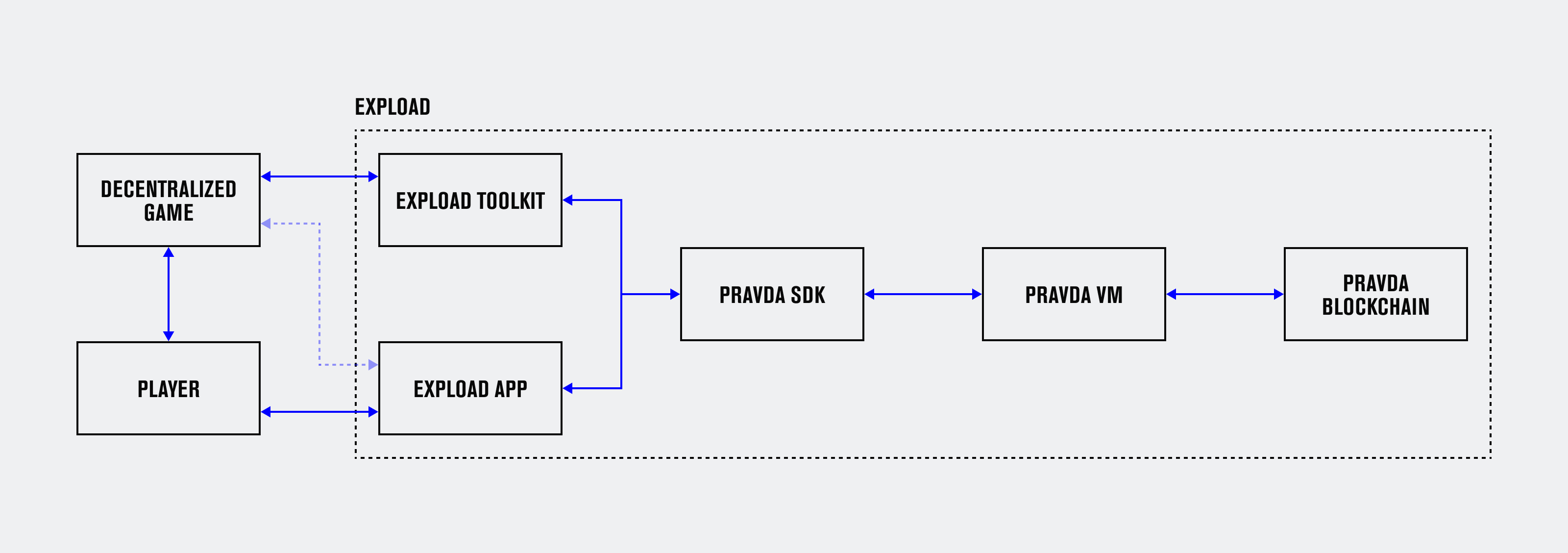
Economy
The underlying philosophy of our platform implies the engagement of a wide audience of classic gamers. However, the concept of blockchain (hence, of cryptocurrency) is extremely complex at the current stage of their development. The process of immersing a newcomer into the blockchain mechanisms requires an enormous effort and therefore many are left behind (a high conversion barrier).
For casual users to feel at ease and comfortable when performing in-game transactions, the platform should enable payment card acquiring. However, there’s no way to use payment card acquiring to directly transact in listed cryptocurrencies, since Visa and MasterCard would block processors who attempt to handle purchases and sales denominated in such traded cryptocurrencies.
To avoid this, the exchanges could be possibly integrated atop the platform. However, this would scare away the casual user, given that:
- They would have to undergo the KYC (Know-Your-Customer) procedure, that is to prove their identity by attaching scanned copies of documents and wait until the verification is complete.
- Crypto exchanges charge a high fee (15-30%), since cryptocurrencies are prone to volatility.
In an effort to tackle the outlined challenges, we arrived at the solution below. The platform has threecurrencies in circulation, namely:
- XGold (XG), a subtoken emitted within Pravda smart contracts.
- XTrophy, a token for payouts to players.
- XPlatinum (XP), the base currency on the Pravda Blockchain.
These currencies are contemplated to have the following characteristics:
| XPlatinum | XGold |
|---|---|
| Listed | Non-listed |
| Platform’s base cryptocurrency | Stablecoin |
| Can’t be purchased on the Expload platform directly via Acquiring or InApp Purchase | Emitted within Pravda smart contracts |
| Used as transaction gas and for calling on smart contract methods | Platform’s uniform in-game gold (hard currency) |
| Fixed rate | |
| Secured by incoming cash flow | |
| Token amount is always equal to the amount of funds on Expload’s deposit account | |
| An individual (player) may NOT withdraw tokens into fiat | |
| An individual (player) may NOT transfer tokens to other individuals (players) | |
| Legal entities (game developers) may withdraw tokens into fiat |
XGold Circulation
As a stablecoin, this token can be sold directly on the platform by means of payment card acquiring and KYC free, since its serves as in-game gold (hard currency), which is not allowed to be withdrawn or transferred by individuals.
XGold is emitted by the Expload company, which is also responsible for fixing its rate, €1 = 1 XG. The final rate will be determined once-for-all-time during the platform’s public launch.
When a player buys XGold, the number of tokens emitted within a smart contract equals the incoming fiat amount. For example, if a player deposits €100, the smart contract will emit exactly 100 XGold into the player’s ownership. Fiat is credited to Expload’s deposit account.
An individual may neither sell nor withdraw XGold. Nor may they transfer XGold to other individuals. Likewise, XGold can’t be used to purchase XPlatinum.
Legal entities (game developers) may withdraw their funds earned in XGold through Expload. Expload charges a fee on this transaction. Besides, XGold can be distributed among the players based on smart contracts created by game developers, provided that such smart contracts have been whitelisted by the Expload team. This is how tournament prize pools, which are made up of players’ contributions, can be distributed. Developers can also distribute a portion of their owned XGold through smart contracts among users as an incentive initiative.
Furthermore, once a game developer sells their XGold to Expload, this immediately triggers the burning of XGold at the amount equal to the funds being withdrawn. Hence, XGold is always secured by the funds kept on Expload’s deposit account.
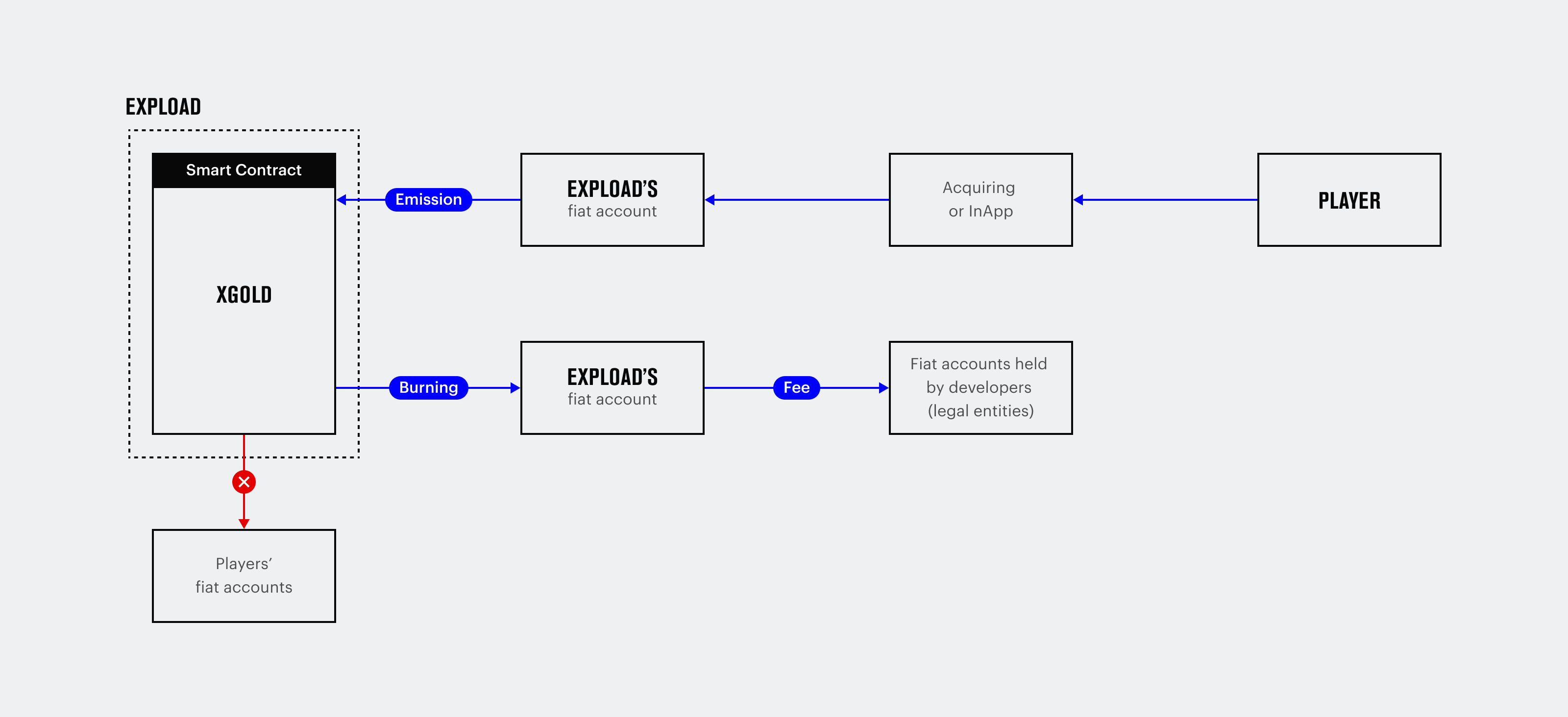
Purchases in XGold
- Let’s assume that 1 XG = €1.
- The developer sets the item’s price in XGold. For example, 10 XG (€10).
- The player holds a certain amount on their wallet, for example, 2 XG, and hence they are short of 8 XG.
- The player initiates a purchase and is offered to pay via card acquiring.
- €8 is debited to the player’s card account and credited to the Expload company account.
- Expload credits 8 XG to the player’s account and pays the respective transaction fee denominated in XPlatinum. The fee amount is determined in the course of payment processing depending on the server maintenance costs and current network load. It is noteworthy that the fee for transferring XGold to the player is payable by Expload.
- 10 XG is remitted to the developer’s account. The transaction fee is payable by the developer.
- The player receives the item within a smart contract, which is responsible for the game’s inventory. The developer is charged a fee in XPlatinum for this operation.
Fractional Unit
The total existing number of tokens represents an integer value. However, certain values such as percentage fees (e.g. 3-5%) should be expressed as fractions. For this purpose, the smallest fractional units miniXGold, miniXTrophy and miniXPlatinum are introduced for XGold, XTrophy and XPlatinum respectively. One XGold is subdivided into 100,000,000 miniXGold, and likewise one XTrophy and one XPlatinum are divisible into 100,000,000 miniXTrophy and 100,000,000 miniXPlatinum respectively (in analogy with Bitcoin, which is equal to 100,000,000 satoshi). In other words, the minimum possible transaction value may amount to 0.00000001 XGold, 0.00000001 XTrophy or 0.00000001 XPlatinum. This helps maintain the accuracy when transacting in fractional values.
Therefore, it should be understood that a transaction worth 0.23 XGold as displayed on the user interface can be also expressed in 23,000,000 miniXGold. For user convenience, transaction values should be shown as round numbers, however with a possibility to see the exact fractional value, by hovering the cursor over the number, as an option. Thus, if a user holds 2.35827492 XPlatinum on their account, the interface will display 2.35 XPlatinum, unless they use the cursor to view the full value. Values should be rounded downward to prevent users from thinking they possess more funds than they actually do.
XGold vs Local In-Game Hard Currency
From the ideological perspective, XGold can and shall be used as a uniform in-game hard currency across the Expload platform. This is not a prerequisite for admitting a game to the platform, however, it is highly recommended using XGold, since maintaining the liquidity of a local token/hard currency would be far more difficult.
XPlatinum in Platform-Based Games
Aside from XGold, games are contemplated to use the base cryptocurrency XPlatinum. Unlike with XGold, the liability and legal aspects related to the use of this cryptocurrency are vested with game developers and players themselves. They are assumed to buy and sell XPlatinum on their own account, going to the exchanges where XPlatinum is listed. The use of XPlatinum enables a new monetization model to be built, a kind of Free2Play 2.0.
Developers can receive XPlatinum from players in exchange for in-game items, which can be used or even consumed in a game, or resold for XPlatinum in player-to-player transactions. As part of incentive initiatives, developers can distribute XPlatinum available on their accounts, among the players.
XTrophy
XTrophy is a ready-made solution for game companies, who want to reward their players with prizes, referral payments or percentage from selling user generated content. Expload solves for companies the problem of legal arrangements for withdrawal of prizes to individuals.
XTrophy lifecycle:
- A game company or service enters into a licensing agreement with Expload;
- It buys the necessary amount of XTrophy from Expload;
- It then delivers winnings and rewards to users via the integrated Expload SDK;
- And forgets about the problems with legal arrangements of payments to individuals;
- The user either converts XTrophy to XGold or sells XTrophy to the company and receives money to a plastic card through the interface of the Expload app.
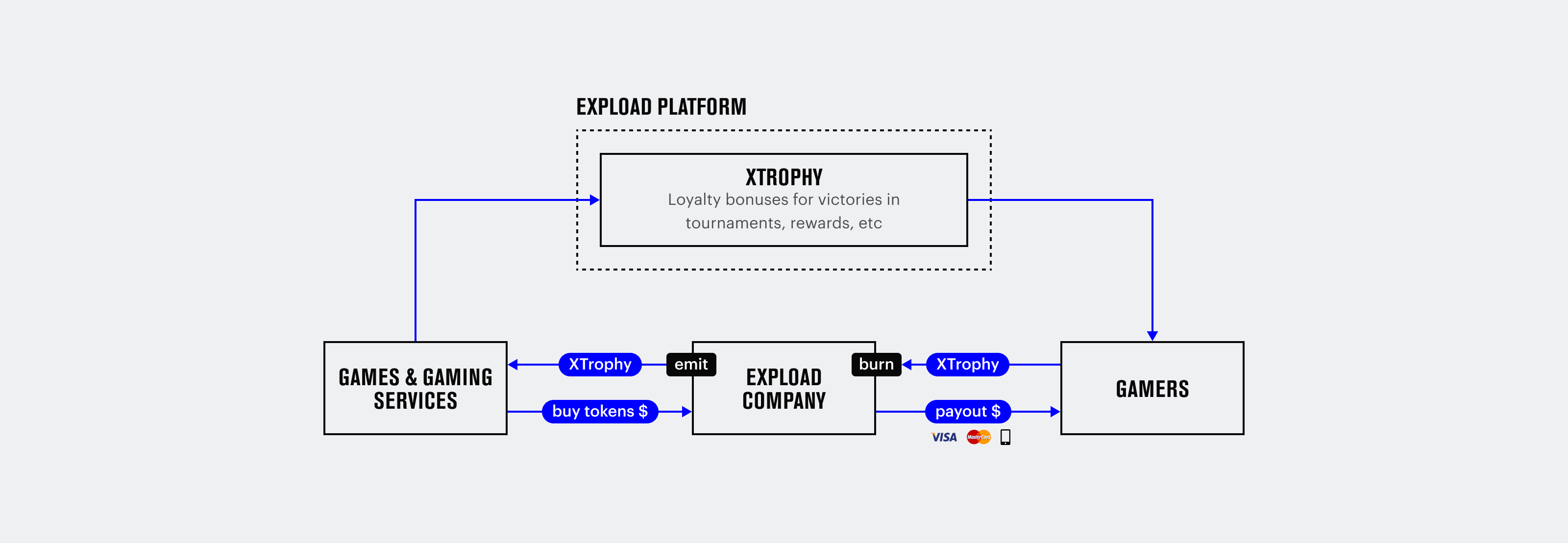
XTrophy has the following properties:
- Sold only to game developers and game services that have entered into a contract with Expload;
- Is issued by Expload at a fixed rate of 1 € = 1XTrophy at the moment of receiving money from legal entities either by bank transfer or by acquiring from a linked company card, with KYC completed;
- Cannot be acquired by players for money, can only be won or received as a reward;
- Cannot be transferred from one player to another;
- Can only be sold to Expload and then withdrawn to a bank card;
XGold, XTrophy and XPlatinum as Standalone Economies
The circulation of XGold and XPlatinum shall be constrained within two independent economies.The underlying reason for this is to prevent users from exchanging XGold for XPlatinum and further withdrawing XPlatinum to exchanges. The player can exchange XTrophy for XGold, which means that items available for XGold may be available to him for XTrophy. The player has no way to exchange XGold and XPlatinum for XTrophy.
Free2Play 2.0
In the classic free2play model, players can obtain premium assets by either spending a fair amount of time in a game or buying the desired asset straight away for fiat money.
The use of cryptocurrency enables us to propel free2play games to a whole new level and introduce the following gradation:
| Asset type | How to get for free | How to get fast |
|---|---|---|
| Free | Playing a game | - |
| Premium | Playing a lot | Buying for XGold (XGold purchased via Acquiring) |
| Super Premium | Playing long term; or not available for free | Buying for XPlatinum (XPlatinum purchased on exchange) |
Therefore, those wishing to reap the whole package of benefits offered by the game, will have to overcome the cryptocurrency conversion barrier posed by crypto exchanges and crypto markets.
Basically, the platform’s two-currency model enables a casual user to be eventually converted into a crypto enthusiast.
Business Model
Expload is contemplated to generate its income from:
- XPlatinum capitalization
- XGold withdrawal fee charged on game developers
- Optional fee charged on XGold transactions within smart contracts
- Fees charged for selling XTrophy to game developers;
- Fees charged on XPlatinum transactions within smart contracts
Developers can earn their income from:
- Primary sale of assets for XGold and XPlatinum
- Charging a fee for resale of assets
- Taxing the game mechanics such as tournaments
- Taxing the mechanics existing around games such as clan economy
You can learn more about the game developers’ economy from the potential use cases below.
For Developers
The Expload platform offers the following features and benefits to game developers:
- SDK for the rapid integration of classic games with the Pravda Blockchain.
- A space for distribution of decentralized games.
- A legal solution for payouts to players;
- A legal solution for cryptocurrency related activities.
These enable game developers to:
- Rapidly integrate the existing games with the blockchain by transferring part of the economy to the open source.
- Develop new games, initially devised as decentralized.
- Access a new game distribution channel through the Expload App store.
- Derive income from the infrastructure around games, which is currently in the gray zone for developers.
For instance:
- Taxing the secondary market of digital assets.
- Mutually beneficial integration with the clan economy and taxing the economy.
- Integration with the technical facilities (the economy) of streamers and other opinion leaders.
- Creating markets for user generated content.
- Using the platform for crowdfunding purposes.
For Players
The key benefit for players would be a stunningly new gaming experience they acquire in open-economy games. There, they can earn an income, come into the true possession of a tiny piece of their favorite game, and create game universes jointly with game developers.
However, the above implies that players understand the concept behind blockchain and decentralization. The platform is devised in such a way as to ensure a smooth and secure immersion of players into the decentralized world.
To achieve this, the following is envisaged:
- Splitting gamers into two categories: Classic Gamers and Crypto Enthusiast Gamers (see the details below).
- Payment card acquiring for in-game purchases (as relates to XGold).
- Two internal currencies: XGold and XPlatinum. Users gradually come to realize that the platform’s benefits go hand-in-hand with the use of XPlatinum (real cryptocurrency).
Two Types of Gamers (Platform Users)
The platform’s users are divided into two categories: Classic Gamers and Crypto Enthusiast Gamers.
In the world of cryptocurrencies, all of the user’s possessions are accessible through their wallet’s private key. The loss of the private key leads to an irretrievable loss of everything kept in the wallet.
In order to avoid miscellaneous problems that are likely to be caused by casual users losing their keys, private keys to all newly created casual user accounts are by default generated and stored in the special vault on Expload’s centralized servers. Holders of such accounts are referred to as Classic Gamers.

At the same time, we cater to the needs of crypto enthusiasts and therefore enable account conversion from Classic Gamer to Crypto Enthusiast, with the keys relocated to the user’s local machine.
Classic-Gamer-to-Crypto-Enthusiast Transformation Scenario
A potential scenario of how a Classic Casual Gamer transforms into a Crypto Enthusiast might look like this:
- A casual gamer downloads the Expload App
- and is classified as Casual Gamer by default.
- They start playing,
- discover free2play games and, provided that they are prone to pay, start using the standard acquiring solution.
- Later on they realize that certain players possess super premium assets, and try to find out how to obtain them.
- They learn that such assets can be purchased for the cryptocurrency, which is traded on the exchange.
- They become a crypto paying player (in this category, the share of paying users is even smaller, however, the crypto paying audience may have a higher average spend).
- This person can choose to convert their account into that of Crypto Enthusiast.
That said, a player is not supposed to necessarily become a Crypto Enthusiast. They can keep playing games on the platform and enjoy without even having the slightest idea of cryptocurrency, as is often the case with the typical non-paying free2play audience.
Pravda Blockchain
The blockchain underpinning the Expload platform is based on the Tendermint library (https://tendermint.com) and possesses the following features:
- BFT consensus
- Node authorization through Proof-of-Authority
- Virtual machine designed specifically for games:
- Stack-based
- Turing-complete
- High-level (knows the data types)
- Enables deterministic floating point calculations
- Uses programs instead of smart contracts
- C# as a base smart contract language.
It is envisaged to enable Ethereum VM bytecode translation into Expload VM bytecode.
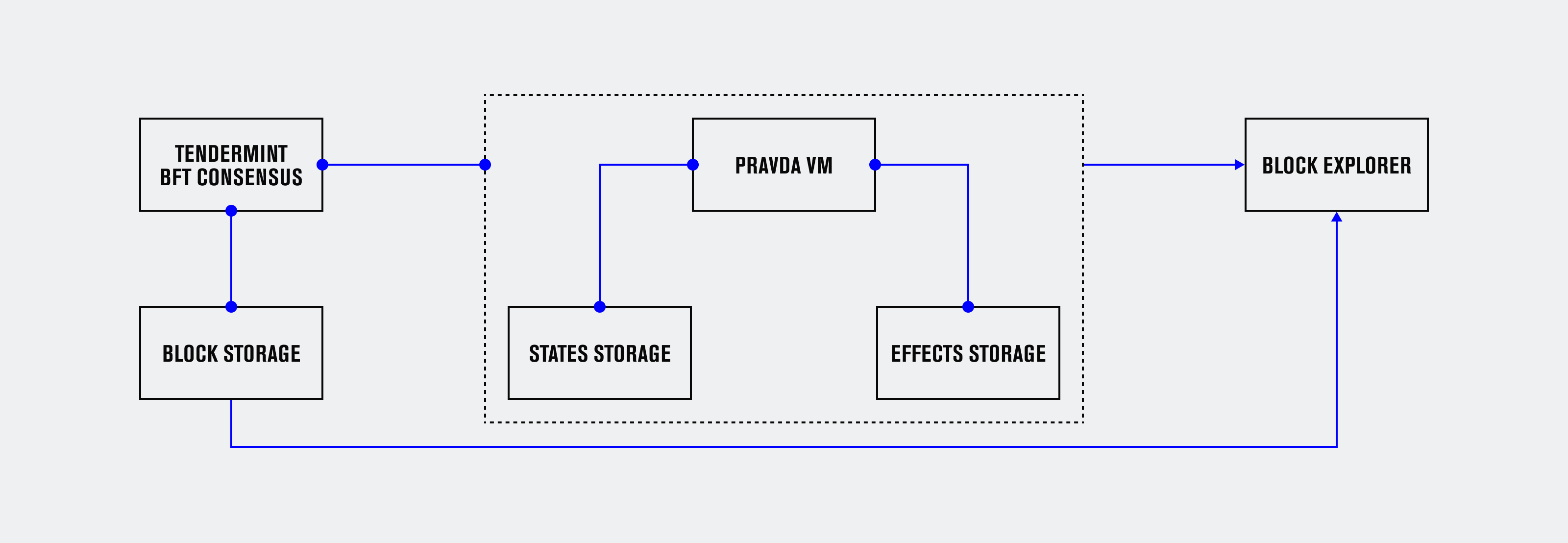
Pravda VM Programs
The practice of using Ethereum smart contracts proves that their immutability is actually achieved by means of linking two smart contracts. One of the contracts is immutable, and it keeps the address of the other smart contract, where the logic is stored. When the logic needs to be changed, the second smart contract is redeployed in the network, while in the first one the address is changed.
Therefore, to make it easy to operate, our smart contracts are modifiable and can be updated at any time using their initial address. Our smart contracts are therefore referred to as Programs.
However, for the sake of trust, any Program can be sealed and become a true smart contract.
Proof-of-Authority
During the first stage of operation, our network will utilize the Proof-of-Authority algorithm. In other words, block validators will be directly selected by the Expload company, among large game developers.
This is done for two reasons:
- Being solely responsible for authorization, the Expload company can update the nodes code without having to reach consensus with all of the (node) holders during the network’s rollout and debugging.
- This will nurture a sense of owning user data among game developers and hence increase their involvement.
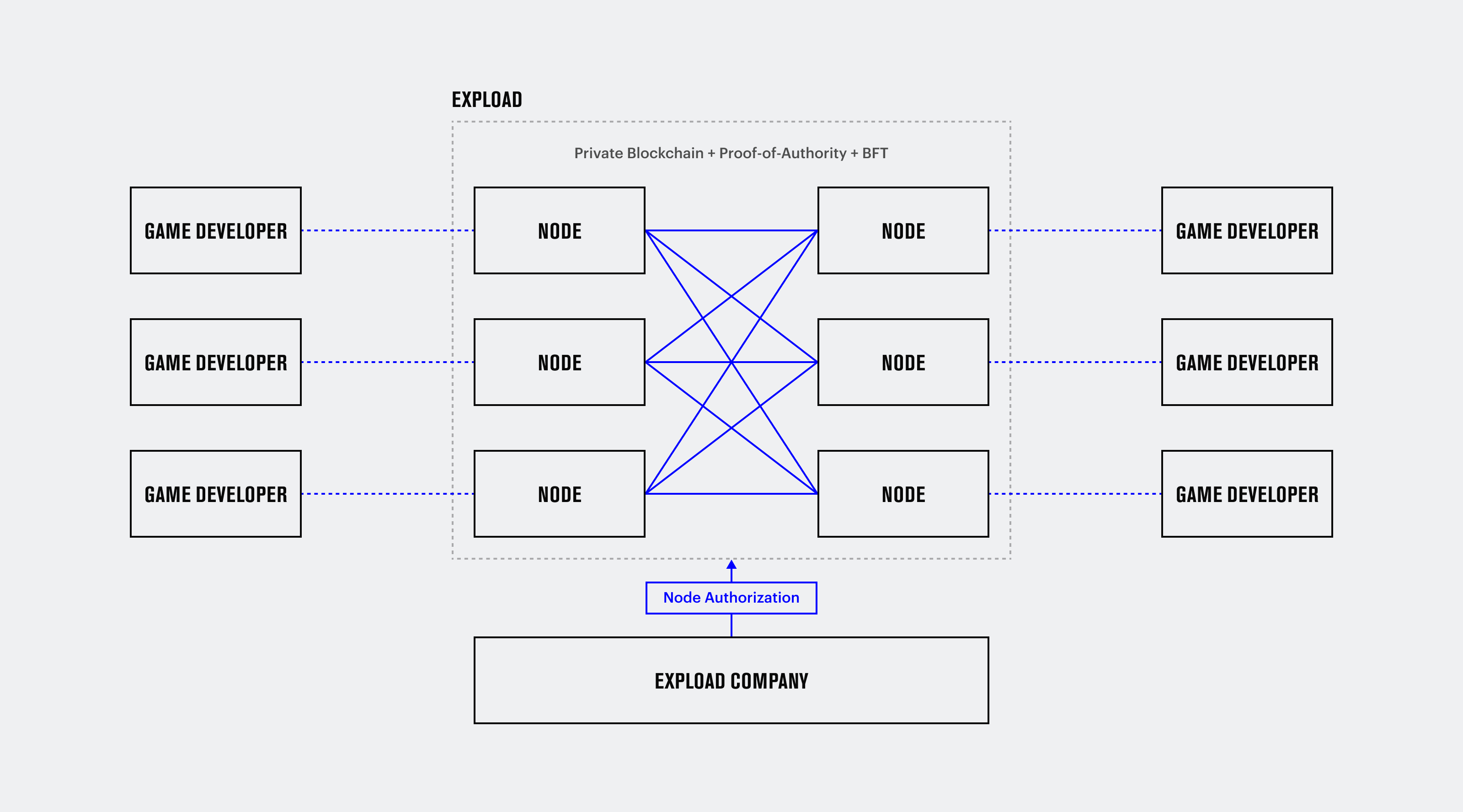
Decentralized Game Architecture
A decentralized game is comprised of three core components:
- Game client: a standalone or web application that a user directly interacts with.
- Private backend: a centralized server owned by the game developer:
- Executes the game logic hidden from players (private logic). Whether a piece of logic is to be executed on the private or public server, is decided by the developer. Logic in its entirety can be implemented on the blockchain.
- Provides metadata for the public server, such as images for assets represented as tokens on the public backend (blockchain).
- Public backend: a set of smart contracts performed in a decentralized environment (on the blockchain):
- Executes the game logic exposed to players (public logic).
- Secures transparent ownership of in-game inventory, contains rules for emission, sale and resale of inventory.
The game’s public backend serves as the evidence of players’ ownership rights.

SDK for Open-Economy Games
Software Development Kit (SDK) is a high level development tool for decentralized games, that aims to push forward the development of blockchain-powered games through providing a smooth access for game studios.
SDK components:
- Pravda SDK:
- Authorization service interface
- Acquiring service interface
- Low level blockchain interface
- Smart contract interface
- Expload Toolkit:
- Ready-made economic solutions library (smart contracts and complementary program code)
- Standard acquiring UI
- Standard marketplace and auction UI
- Expload Toolchain:
- C# and Solidity translators to Expload VM bytecode
- Deployment tools
- Test environment
- Administration, telemetry and analytics tools for launched games
Check out the links below for the detailed technical description of SDK and Pravda Blockchain:
https://developers.expload.com/documentation/ https://github.com/expload/pravda
User Application
Expload App provides players with the following:
- Game store
- Own game library
- In-game item storage and management inventory
- In-game item trading/exchange marketplace
- XGold wallet
- XPlatinum wallet
- Payment system enabling purchases in XGold on game and non-game stores outside of the Expload platform
The application is being implemented for the following platforms (in order of priority):
- PC
- MacOS
- Web
- Android
- iOS
- Linux
Potential Use Cases
Digital Assets (In-Game Items as Assets)
The simplest and most obvious use of blockchain in games would be to store the item’s ownership attribute inside smart contracts. This applies when a developer decides to alienate part of their (premium) inventory to players. Players become true owners of items and can sell them to each other, which gives them a sense of truly possessing of a piece of the game.
It is important to understand that smart contracts do not store items as such, but an ownership attribute, showing that ID_item belongs to ID_player. This is similar to having a land title evidenced by a certificate, while the land plot as such can’t be relocated or squeezed into the owner’s pocket. Likewise, the player can have an ownership right to a certain in-game item, however, the item would exist at the developer’s end. The developer would be responsible for making this item available to the player. The ownership right to an item is transferable, same as to the land title.
As regards smart contracts, the notions of primary and secondary sale should be distinguished.
Primary Sale for XGold
Primary sale occurs when an item is sold to a player by the developer at a price set by the latter. Sale transactions are made in XGold (hard currency). In the event that a user has insufficient funds, XGold can be pre-purchased on the Expload platform via payment card acquiring (or via InApp Purchase in a longer run).
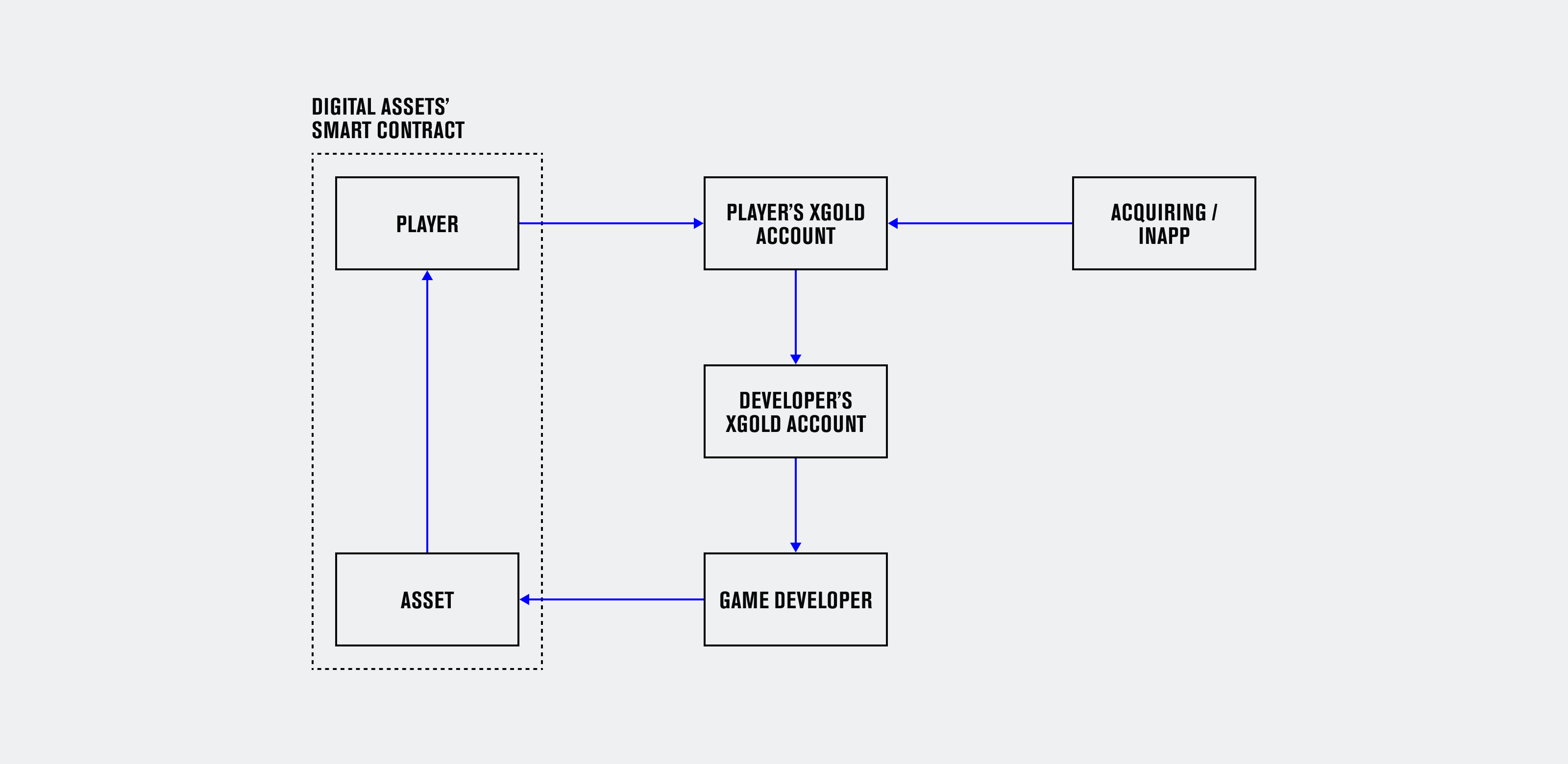
Primary Sale for XPlatinum
Game developers can opt to sell a certain class of items for XPlatinum, provided that this fits into their economy. In this case the responsibility for replenishing the account on the exchange or market is vested solely with the player. This option is meant for hardcore crypto enthusiasts (see the Free2Play 2.0 section above).
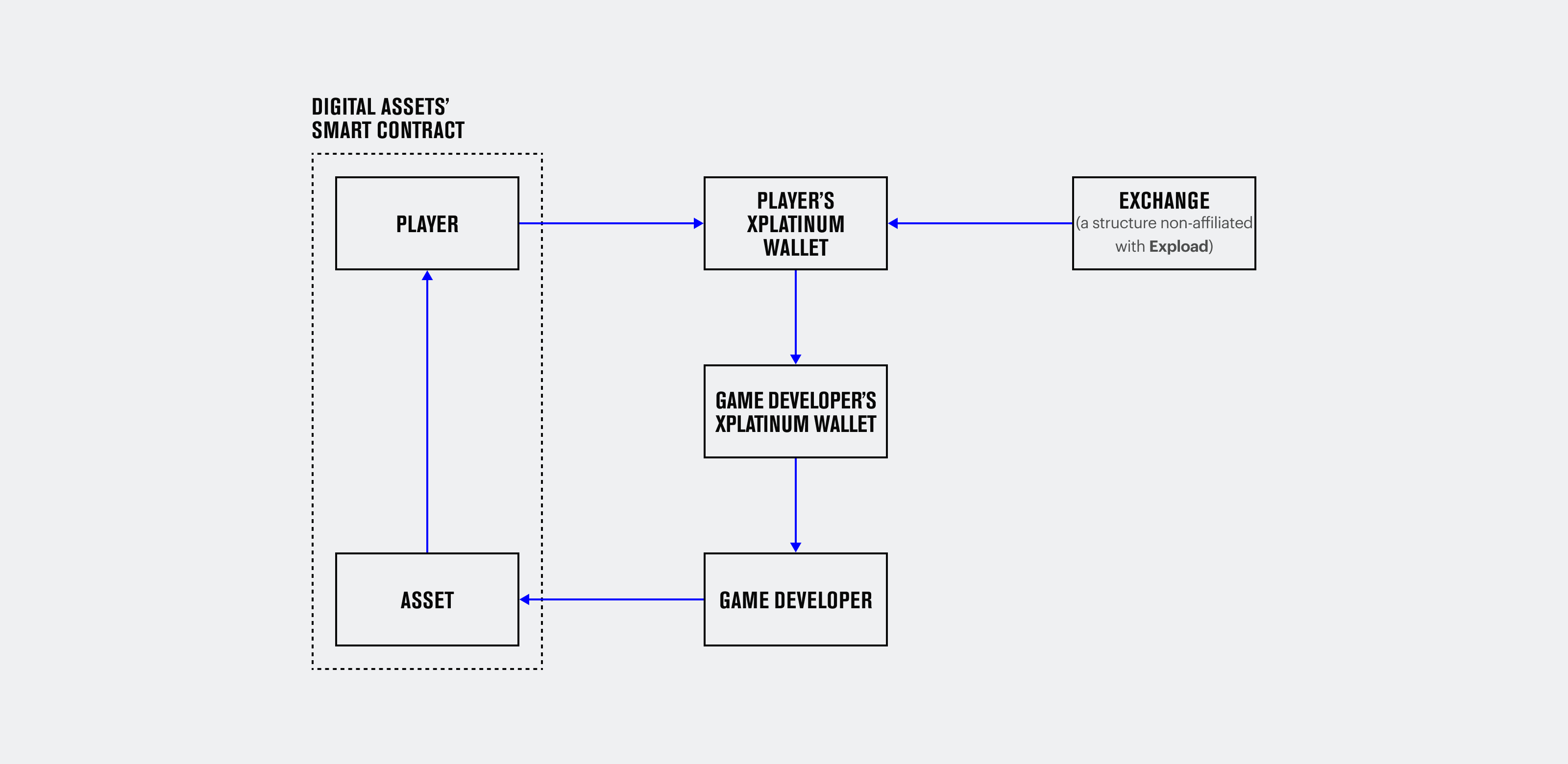
Secondary Sale for XGold or XPlatinum
A secondary sale occurs when a player sells an in-game item to another player on the marketplace provided by the Expload platform. Items are resold on the basis of smart contracts, which enables game developers to tax the transactions.
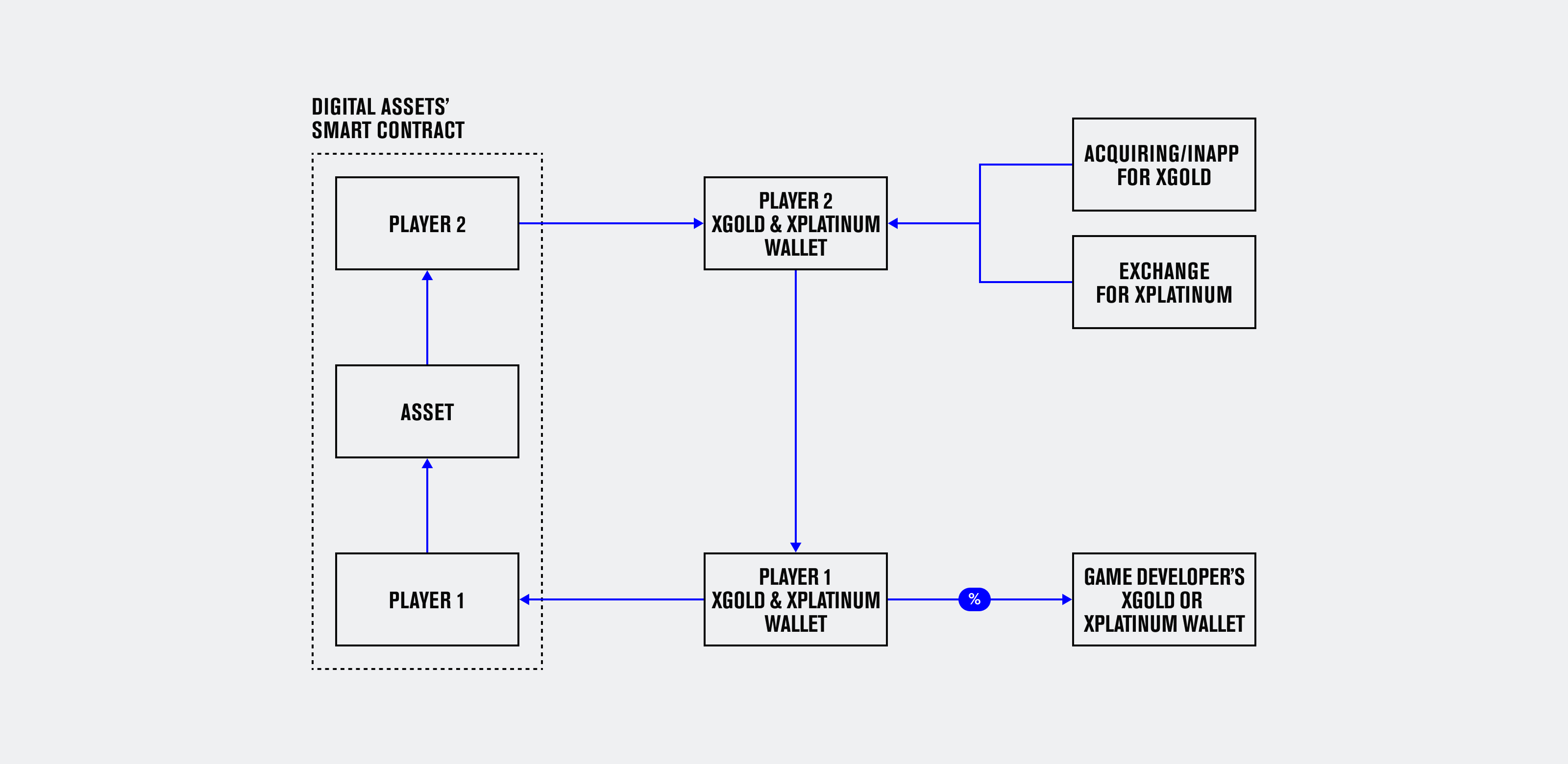
Tournament Mechanics
Players can hold fair tournaments based on smart contracts. Prior to the start, they make contributions to the tournament’s wallet. The tournament is followed by reward distribution. Everything is carried out in a transparent and fair manner. The reward is duly taxed by the developer.
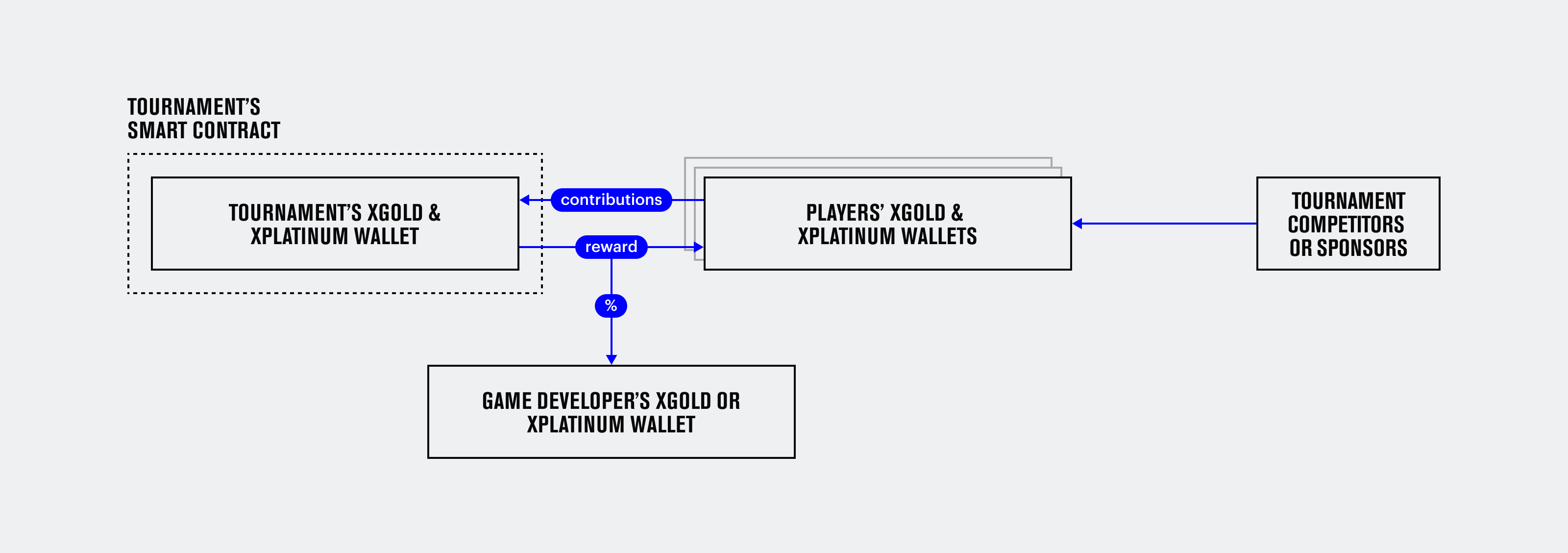
Clan Mechanics
Today, we witness an increasing number of infrastructure and around-game events. Gaming clans as structures growing around games are worth special attention. A gaming clan represents a community of people who play a multiplayer game together and pursue common goals (as a rule — to outstrip other clans).
Inside the clans, we often see financial relations emerge, when a clan starts resembling a small firm. There are sponsors who are ready to contribute massively into clan development. There are officers who are assigned with an arduous task of clan management, and receive real salaries for this. There are common folks that need to be controlled somehow.
Clans often use task management systems similar to JIRA’s. However, they encounter an issue of controlling task progress. In order to automate this process, they need the game’s API. Games, however, are not interested in providing the API as they are not motivated economically.
There is an option proposed where both parties could benefit. The game provides a clan with API to automate the clan management process. In exchange for this, the clan pays taxes to the game developer’s benefit within a smart contract.
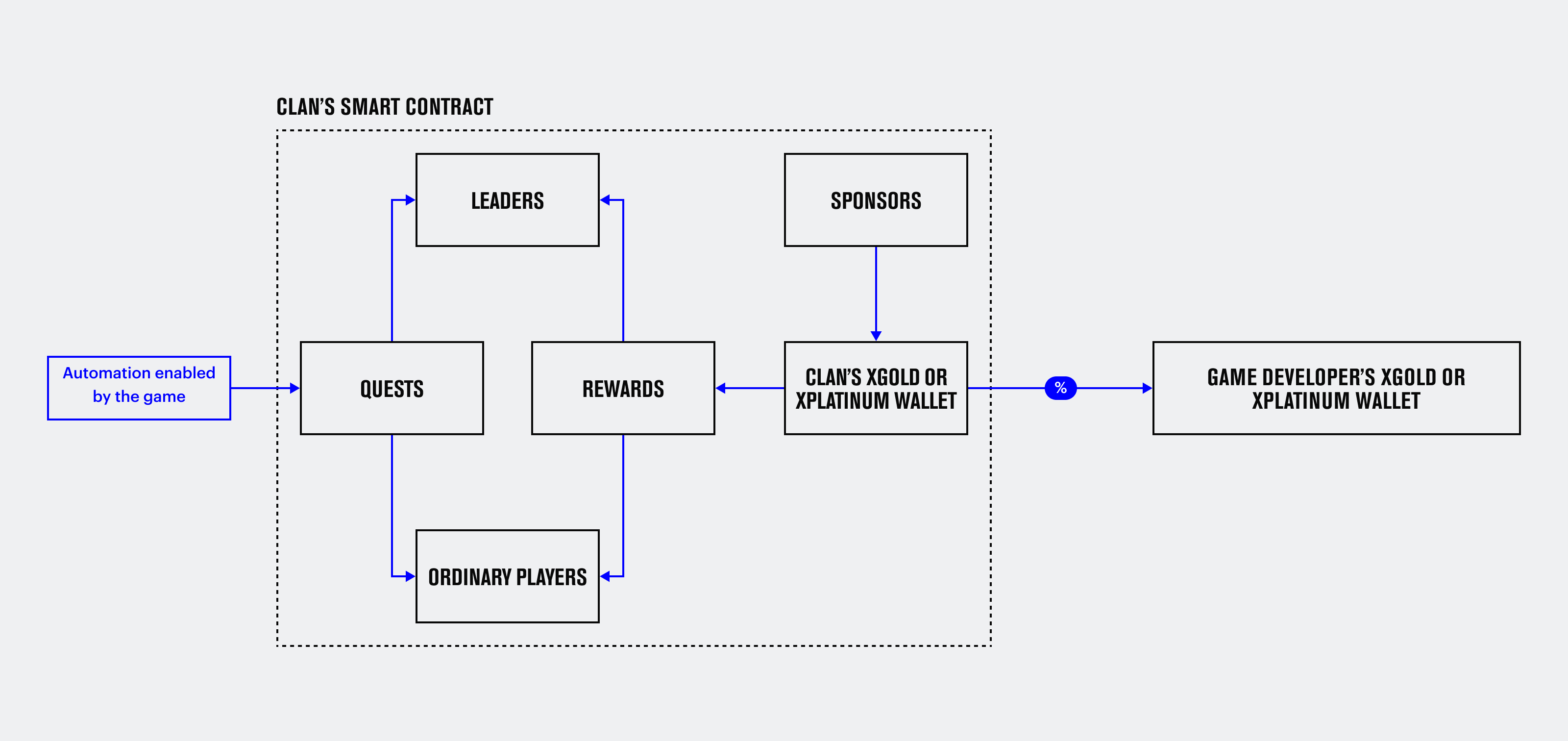
Other Use Cases
Lease of Items
Players can offer their items for lease to other players. The game developer would receive a percentage. This could work well where premium items are linked to the protagonist’s level and are sought after by players at a certain stage of developing the protagonist. For instance, a premium item for level 40-50 players. After 1-2 weeks of advanсing from level 40 up to level 50, the item becomes no longer relevant. However, the primary price is high and not many can afford to buy this item, especially when they need it for a week or two.
In-Game Property Insurance
Property insurance in hardcore games. Hardcore mechanics games are currently regaining their popularity. When lost in such a game, an item or another property is gone forever. Besides this, blockchain mechanics induce users to perform irreversible actions in games. For those who want to mitigate their risks, the platform offers insurance options.
Fair Loot Boxes
The content of loot boxes could be pre-generated within smart contracts. For instance, when the content of a series of loot boxes is generated by a developer as an array, encrypted and packed into a smart contract. Once a user receives a loot box, they are granted a key to decrypt and extract its content. The decryption algorithm is always transparent and the fairness of pre-generation is always verifiable.
User Generated Content
There is an opportunity for enthusiasts to add their content to the game. A user generated content market can be established, where users would sell content to each other, while this activity can be taxed by the developer.
Exclusive Items by Opinion Leaders
Opinion leaders, such as well-known streamers, can emit exclusive in-game collectibles (with special attributes as an option) and sell them during the course of their streams, while this activity can be taxed by the developer.
Cross-Game Exchange
The platform enables cross-game exchange of items — what is earned in one game can be used in another. This prompts the formation of open game economy that would have an overall positive impact on the economy of every single game. This requires cooperation between game developers.
Crowdfunding for Game Development
Game developers can run crowdfunding campaigns to push forward their developments by way of pre-emitting their to-be game’s assets within a smart contract and pre-selling them to players.